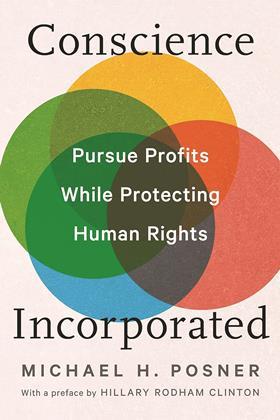Conscience Incorporated: Pursuing Profits While Protecting Human Rights
Michael H. Posner
£24.99, NYU Press
★★★★✩
Michael H. Posner takes us through his experiences as a lawyer, state department official and director of the Center for Business and Human Rights at NYU Stern School of Business, presenting a powerful case for the centrality of ethics in business.
There is nothing new in the idea that businesses should be run ethically. Business without an ethical heart is just theft. However, as societies and technology became more complex, more people were affected by how businesses were run. Workers, consumers and the environment all pay both a direct and an indirect price in the race for profit. How (and where) the protective lines should be drawn, even where they frustrate the race for profit, is the subject matter of this book.
The work is broken down into four broad themes. The first three look at: the problems that arise from outsourcing; ethical investing; and new tech, winding up with a review of some of the successes that have been scored when governments and business leaders have worked together for the common good.

The backdrop of Conscience Incorporated is not individual legal systems but rather how corporations operating globally have played the game to their advantage, but also to the disadvantage – sometimes fatally – of workers elsewhere. If it costs too much to make things domestically, then products get made where factories are not covered by health and safety requirements and employees do not have the benefit of effective rights, still less trade union membership.
Of course, even the most powerful nation cannot directly legislate on its neighbour’s working conditions. But what it can do is ensure that imported goods are not the product of slave labour in the supply chain, or that rare earth metals have not been mined by children.
This introduces an interesting contrast between advocates of a global human rights approach when it comes to international trade, and those that seek tariff-based protectionism – and why the case for the former, as made out by Posner, is more likely to achieve its aims than the latter. A human rights-based approach to workers globally should remove the race to the bottom that some countries have exploited in providing the west with cheap manufactured goods. As working conditions improve, so will the cost of exported goods: cost moves from the (exploited) worker to the (more affluent) consumer. The erratic tariffs we’ve seen from president Trump aim to bar cheap imports altogether, but will decreasing trade really stimulate US manufacturers? Costs increase with no benefit to the worker and with decreasing global demand for goods made in the US. In terms of increasing the common good, my money is on Posner.
While not a conventional law book, this deserves to be read by lawyers. We have taken tentative steps towards some of Posner’s aims with statutes such as the Modern Slavery Act 2015. More is to be done, though. This book will hopefully stimulate discussion and perhaps help show that without multinational corporations being mandated to consider and report on human rights, the environment and anti-corruption practices, domestic legislation on topics such as labour law will be rendered ineffective.
Max D Winthrop is a partner at Sintons LLP in Newcastle
Conscience Incorporated
★★★★✩
Michael H. Posner’s book examines the relationship between business and human rights, reflecting the author’s deep experience. Its style is journalistic and readable, but its content deep and seminal. It deals with issues that go to the heart of one’s calling as a lawyer and to the soul of the human condition as it grapples with business and ethical concerns.
The book is factual but also polemical and includes examples of the author’s experience of international companies and their responses to human rights challenges in the countries where they or members of their supply chains operate. Supply chain accountability is one of the big issues addressed. Graphic accounts are given (such as the 2013 Rana Plaza fire in Bangladesh) of how big business can distance themselves, knowingly or otherwise, from human rights problems in their supply chains. ‘Ethics in the Age of Outsourcing’ is a chapter in itself and addresses head-on the things that can go wrong with supply chains from a human rights perspective.
The book takes the reader on a journey through the business and human rights agenda in many countries and industry sectors. The technology and financial services sectors lead the charge in many ways but there is also a focus on more traditional industries, and indeed on the relationship between them (for example, mining) and the new technology-based industries.
A whole chapter is devoted to ‘The Particular Problem of China’, including the treatment of Uyghurs in Xinjiang province.
While there is no chapter focusing specifically on the lawyer’s role, the book is littered with references to how laws (such as the UK’s Modern Slavery Act 2015) and cases have made a difference to the business/human rights analysis.
The book is very current but was written before the new Trump administration took power with its ‘drill, baby, drill’ mantra. It remains to be seen how the changing political landscape will affect the interplay of business and human rights. There is a case for a second edition in the near future.
David Glass is a consultant solicitor at Excello Law































No comments yet